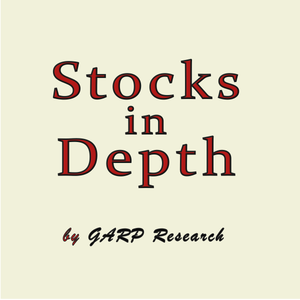
Stocks-in-Depth
Bill Baker, CFA
Quality small-cap and mid-cap stocks: Earnings growth and competition fundamentals
- 1 hour 3 minutesSID 0039 Mitel (MITL) - Part 1
Mitel has was long relegated to obscurity within the institutional investment community. However, the discussion in this series of episodes will broadly portray what we find are Mitel’s underappreciated competitive strengths. In episode 39, we first lay out how Mitel came to be a major, if little known, player in providing cloud telephony services to businesses.
18 January 2019, 8:42 pm - 1 hour 18 minutesSID 0038 Realty Income Part II
Realty Income has a diversified portfolio by sectors within the single parcel commercial property market. What are the risks of each sector, and how does management approach each?
21 December 2018, 1:37 am - 41 minutes 49 secondsSID 0037 Realty Income (O) - Part 1
Realty Income operates in a commoditized industry, the ownership of standalone real estate parcels used by certain commercial retail enterprises. In this podcast, we discuss how Realty Income structures its business to provide diversification and attempts to differentiate its offering.
21 November 2018, 11:40 pm - 48 minutes 15 secondsSID 0036 Knowles (KN) Part III
Demand for MEMS microphones increased greatly when Apple put four microphones into the iPhone7. What might further stimulate the worl's appetite for MEMS microphones? In this podcast, Stocks in Depth discusses potential for new technologies like the internet of things (think Alexa) and 5G networks (think machine-to-machine communications) that might continue to cause MEMS microphones to proliferate.
18 October 2018, 2:57 pm - 1 hour 23 minutesSID 0035 Knowles - Part 2
Knowles two most important businesses, MEMS microphones and hearing aid components, share a common theme of eroding market dominance. But, management has devoted a large percentage of revenue into R&D that might address new developments. In Part 2 of this podcast on Knowles, we discuss how Knowles has positioned itself to capture new sources of demand from the internet of things (IoT), and how it has addressed greenfield needs in hearables, e.g. small earbuds, which require distributed processing power. We also discuss how packagers enjoyed a huge upswing in recent years, but have begun to back off, in our opinion shifting the balance of power back towards the two clear leaders in the upstream production of bare microphone dies, Knowles and Infineon.
12 October 2017, 11:28 pm - 1 hour 32 minutesSID 0034 Knowles (KN) - Part 1
Knowles Corp. has suffered mightily since its spinoff from Dover Corp. in early 2014, mostly from the disastrous acquisition of Sound Solutions. MEMS penetration of smartphones, currently around 1.7 globally compared to 4 per iPhone, can continue to rise, since this statistic is nearer to one mike per phone outside of Apple. GARP Research has published a major report on artificial intelligence earlier in 2017, part of which discusses advancements in speech recognition. Amazon's Echo / Dot makes use of AI, as do new clones of Alexa developed by Chinese companies like iFlytek. This multi-part podcast discusses many of these fascinating developments, including how the emergence of the internet of things could also positively impact MEMS microphones sales.
10 September 2017, 10:26 pm - 55 minutes 32 secondsSID 0033 Free Trade Doesn't Work - Part 4
Donald Trump is about to be inaugurated as the 45th president of the United States. As far as we can tell, every other country in the world advances a self-serving industrial policy, to the detriment of the United States, which embraces free trade. In this final episode of Stocks-in-Depth’s review of Ian Fletcher’s 2010-2011 book, Free Trade Doesn’t Work, we start by presenting the author’s case that China, Japan, and Europe have emphasized industrial policy over free trade for years. Fletcher’s solution for the U.S. is a flat tariff, which would eliminate the influence of lobbyists and the inefficiencies of propping up dying industries. We suspect that Trump's appointment of Peter Navarro to run the National Trade Council might signal that this proposal is on the table. If the Trump administration considers imposing a flat tariff to balance the trade deficit and stimulate job creation, what would the economic outcome be? What are the investment implications? Are there second and third order effects that might be considered? Might inflation result? In this conclusion to its 4-part series on free trade and the flat tariff solution, Stocks-in-Depth moderator Bill Baker, CFA examines each of these questions and more in this exciting extension of thought to what Ian Fletcher wrote prophetically in 2010-2011.
21 January 2017, 5:00 am - 41 minutes 53 secondsSID 0032 Free Trade Doesn't Work - Part 3
Institutional investment strategists follow economic and market data closely, and tend to weave together a narrative that explains the current trend. Presently the US dollar is rising, like it has two times before in the last few decades. In this podcast, we sample the perspective of Brown Brothers Harriman currency strategist Marc Chandler, whom we believe mistakenly thinks the rising dollar is proof that the U.S. trade deficit is benign. In Part 3 of our series, Free Trade Doesn’t Work,” Stocks-in-Depth pulls apart the numerous assumptions behind Chandler’s thesis, except one: the powerful effect of interest rate differentials on the current momentum of the dollar. Chandler will most likely be right in the short term, and he’s likely to try to make the opposite call when intervention stops the dollar’s path, as was the case in previous bull markets. But he is wary of the rise of what he dubs “populism-nationalism,” in Europe and America, for it might put the stake into the heart of free trade. For Chandler, it is a myth that the gigantic trade deficit, which has opened up since the early 1970s when the dollar was severed from its gold backing, means that the dollar is overvalued or that free trade is a failed policy. To us, that’s a straw man, for currency pairs will always ebb and flow to the rhythms of the global credit cycle and capital’s desire to cross borders for investment purposes. If the theoretical case for free trade has been falling apart since nearly the beginning of the millennium as economist Ian Fletcher contends, then further dollar strength would only ratchet up the pressure that is boiling under the surface in the form of populist-nationalist movements.
14 January 2017, 5:00 am - 1 hour 14 minutesSID 0031 Free Trade Doesn't Work - Part 2
The historical record shows that countries that rise to economic greatness did so through a strong industrial policy, which incorporates tariffs and non-trade barriers. Moreover, at their apex these powers tended to adopt free trade, some vainly thinking that in doing so they might change the world for the better, but nevertheless be able to kick away the ladder upon which others might follow to industrial might. In Part 2 of this special edition of Stocks-in-Depth, we review what economist Ian Fletcher calls the “forgotten history” of trade, and show how it contradicts the premises of classical economist David Ricardo’s theories of comparative advantage. We also devote much of this podcast to presenting the many flawed assumptions behind Ricardian economic theory, as illustrated by the realities of the emergence on the world scene of great economic powers: England, the United States, Japan, and China.
7 January 2017, 5:00 am - 39 minutes 10 secondsSID 0030 Free Trade Doesn't Work - Part 1
History is replete with unanticipated events: Pearl Harbor, the dismantling of the Berlin Wall, the 2008 credit meltdown, and now the improbable ascendance of Donald Trump to America’s highest office. Yet there are many who previse change, but whose ideas are so unorthodox that they are never see the light of day until after the fact. With this in mind, Stocks-in-Depth introduces a little known economist, Ian Fletcher, and his 2010/2011 book, Free Trade Doesn’t Work: What Should Replace It and Why, in this four-part podcast. In Part 1, we present the last chapter of his tome, The End of the Free Trade Coalition, an analysis of political cycles going back to 2004 which in fact strongly presaged that Mr. Trump might sweep the electoral college in 2016 on the basis of appealing to workers displaced by nearly two decades of free trade agreements and their consequences.
1 January 2017, 5:00 am - 44 minutes 14 secondsSID 0029 Generac (GNRC) Part 4
When we first examined the home standby generator market, we were struck by what seems to be a unanimity of opinion that tremendous secular growth would be driven by homeowners increasingly discovering the benefits of having an automated system to supply electric power in times of outages. It’s argued that penetration is low, and that loss of power is not only inconvenient, but uneconomic, for food spoils and families must seek alternative shelter. Yet as we looked into the matter, we saw that there was smart grid technology available for deployment that could sharply reduce truck rolls necessary to restore power after storms have hit. This could reduce both the number of outages and their average duration. The Berkeley Lab published an exhaustive grid reliability study in August 2015, which we thought would shed light on the subject, but the report failed to ever mention this possible solution. In quarterly earnings reviews, Generac management and institutional analysts covering this stock seemed to neither volunteer any information about the smart grid nor would they ask about it. Is grid technology an existential threat to Generac’s business? In this last segment of our discussion of Generac, we try to piece together this puzzling avoidance of what one would think is a crucial consideration for Generac shareholders.
25 December 2016, 5:00 am - More Episodes? Get the App
Your feedback is valuable to us. Should you encounter any bugs, glitches, lack of functionality or other problems, please email us on [email protected] or join Moon.FM Telegram Group where you can talk directly to the dev team who are happy to answer any queries.
 Charting Wealth's Daily Stock Trading Review
Charting Wealth's Daily Stock Trading Review
 Value Investing Podcast
Value Investing Podcast
 Best Stocks Now with Bill Gunderson
Best Stocks Now with Bill Gunderson
 Stock Market Mentor Chart of the Day
Stock Market Mentor Chart of the Day
 How To Make Money In Stocks with Investor's Business Daily
How To Make Money In Stocks with Investor's Business Daily
 Financial Analyst Warrior
Financial Analyst Warrior